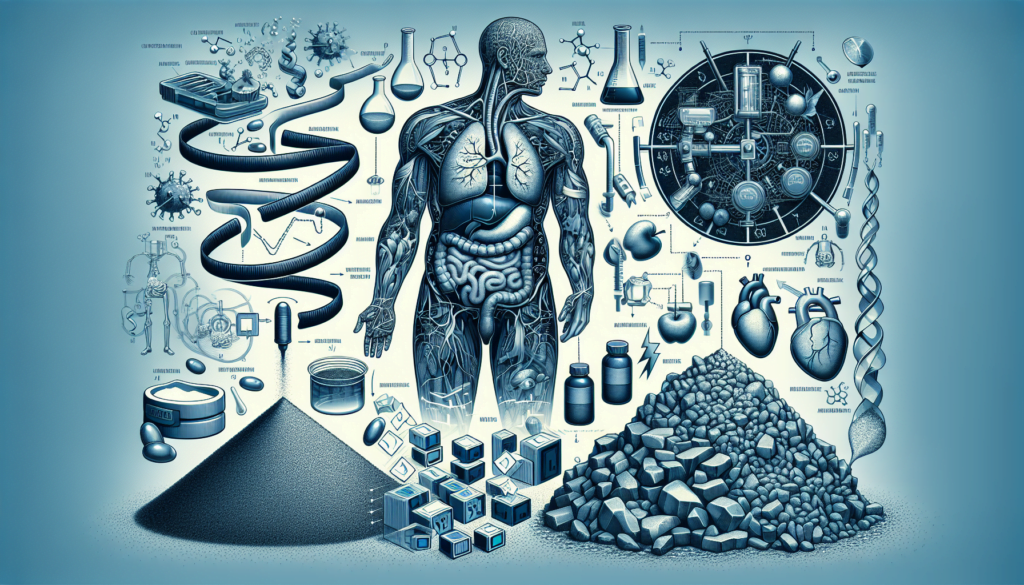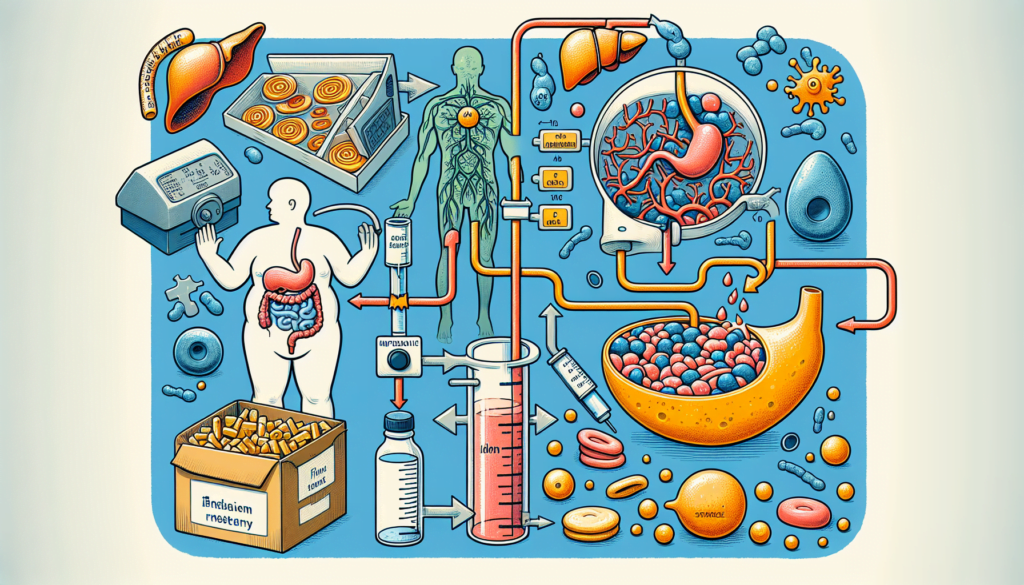If you’ve been struggling with weight gain and wondering if insulin resistance is to blame, you’re in the right place. This article explores the intriguing connection between insulin resistance and weight gain. From understanding what insulin resistance is to delving into its potential impact on your body’s ability to manage weight, you’ll find the answers you’ve been seeking. So, let’s explore the fascinating world of insulin resistance and its potential role in those pesky pounds.

Insulin Resistance Explained
What is insulin resistance?
Insulin resistance is a condition where the cells in your body become less responsive to the effects of insulin, a hormone produced by the pancreas that helps regulate blood sugar levels. When you have insulin resistance, your cells do not absorb glucose from the bloodstream as efficiently as they should, leading to high levels of insulin in your blood.
How does insulin resistance develop?
Insulin resistance develops over time due to various factors, including genetics, lifestyle choices, and certain medical conditions. Overconsumption of high-calorie, processed foods and a sedentary lifestyle are common contributors to the development of insulin resistance. Additionally, being overweight or obese can further increase the risk of insulin resistance.
What are the causes of insulin resistance?
While the exact causes of insulin resistance are not fully understood, several factors have been identified as potential contributors. Genetics play a role, as certain individuals may inherit a predisposition to developing insulin resistance. Poor dietary choices, such as a diet high in refined carbohydrates and sugary foods, can also lead to insulin resistance. Lack of physical activity and excess body weight are additional risk factors for insulin resistance.
The Link Between Insulin Resistance and Weight Gain
Understanding weight gain
Weight gain occurs when the energy intake (calories consumed) exceeds the energy expenditure (calories burned). This excess energy is then stored as fat in the body, leading to weight gain. Factors like diet, physical activity, genetics, and hormonal imbalances can influence weight gain.
How does insulin resistance contribute to weight gain?
Insulin resistance can contribute to weight gain through multiple mechanisms. Firstly, insulin resistance impairs the body’s ability to efficiently metabolize carbohydrates, leading to elevated blood sugar levels. This excess glucose in the bloodstream triggers the release of more insulin, which can promote the storage of energy as fat.
Secondly, insulin resistance can disrupt the balance of other hormones involved in regulating appetite and satiety, such as leptin and ghrelin. This disruption can lead to increased feelings of hunger and reduced feelings of fullness, ultimately leading to overeating and weight gain.
Is weight gain solely caused by insulin resistance?
While insulin resistance can be a significant contributor to weight gain, it is important to note that weight gain is a complex issue influenced by various factors. Other aspects, such as dietary choices, physical activity levels, and overall energy balance, play important roles in weight gain. Insulin resistance should be considered in the context of these other factors when addressing weight management.
Effects of Insulin Resistance on Metabolism
How does insulin resistance affect metabolism?
Insulin resistance has a significant impact on metabolism, particularly the metabolism of carbohydrates and fats. As the cells become less responsive to insulin, glucose uptake is impaired, leading to elevated blood sugar levels. This can further contribute to the development of type 2 diabetes if left uncontrolled.
Role of insulin in regulating metabolism
Insulin plays a crucial role in regulating metabolism by facilitating the uptake of glucose into cells for energy production. It also promotes the synthesis of glycogen in the liver, which is a form of stored glucose. Additionally, insulin inhibits the breakdown of stored fats and promotes the storage of fatty acids in adipose tissue.
Impact of insulin resistance on energy storage
When insulin resistance is present, the body struggles to efficiently store glucose in the liver and muscles as glycogen. As a result, excess glucose is converted into fat and stored in adipose tissue. This can lead to an increase in total body fat and, consequently, weight gain. Furthermore, insulin resistance can impair the body’s ability to mobilize and utilize stored fat as an energy source.

Insulin Resistance and Appetite
Relationship between insulin resistance and appetite
Insulin resistance can have a profound impact on appetite regulation. Hormones such as leptin and ghrelin, which play crucial roles in signaling hunger and satiety, can be affected by insulin resistance. Leptin, the hormone responsible for signaling that you are full, may not be released in adequate amounts, leading to reduced satiety. Meanwhile, ghrelin, the hormone responsible for signaling hunger, may be overproduced, leading to increased feelings of hunger.
How does insulin resistance affect hunger and satiety?
Insulin resistance disrupts the normal hormonal balance that controls appetite. When insulin resistance is present, the body may not receive the signals that indicate satiety, leading to a decreased feeling of fullness after meals. Consequently, individuals with insulin resistance may experience persistent feelings of hunger, which can contribute to overeating and weight gain.
Impact of insulin resistance on food cravings
Insulin resistance can also influence food cravings, particularly for foods high in sugar and refined carbohydrates. When blood sugar levels are not properly regulated due to insulin resistance, there can be a tendency to crave these types of foods to satisfy the body’s desire for quick energy. Unfortunately, consuming these foods can exacerbate insulin resistance and contribute to weight gain.
Insulin Resistance, Insulin Levels, and Fat Storage
Insulin levels and fat storage
Insulin is a hormone that plays a vital role in regulating fat storage in the body. When insulin levels are elevated, such as in the case of insulin resistance, excess glucose in the bloodstream is converted into fat and stored in adipose tissue.
Does insulin resistance directly lead to fat storage?
Insulin resistance itself does not directly lead to fat storage. However, it does contribute to elevated insulin levels, which promote the storage of excess energy as fat. When insulin resistance is present, the body’s ability to efficiently utilize glucose for energy is impaired, leading to an increased conversion of glucose into fat.
How is fat storage affected by insulin resistance?
Insulin resistance disrupts the normal signaling pathways involved in fat metabolism. Elevated insulin levels caused by insulin resistance promote the storage of fatty acids in adipose tissue, leading to an increase in overall body fat. Additionally, insulin resistance can impair the breakdown of stored fats, further contributing to fat storage and weight gain.
Role of Insulin Resistance in Metabolic Syndrome
Understanding metabolic syndrome
Metabolic syndrome is a cluster of conditions that collectively increase the risk of developing cardiovascular disease, stroke, and type 2 diabetes. It is characterized by a combination of factors such as abdominal obesity, high blood pressure, elevated blood sugar, and abnormal cholesterol levels.
Is insulin resistance a key factor in metabolic syndrome?
Insulin resistance is considered a key factor in the development of metabolic syndrome. Insulin resistance contributes to elevated blood sugar levels, which can lead to the development of type 2 diabetes. Furthermore, insulin resistance is often associated with other components of metabolic syndrome, such as abdominal obesity and dyslipidemia.
Interplay between weight gain and metabolic syndrome
While weight gain and metabolic syndrome often coexist, it is important to note that not all individuals who are overweight or obese develop metabolic syndrome. However, excess weight, particularly abdominal fat, is strongly associated with the development of insulin resistance and other components of metabolic syndrome. Weight management plays a crucial role in reducing the risk of metabolic syndrome in individuals with insulin resistance.
Insulin Resistance and Other Contributing Factors to Weight Gain
Genetics and insulin resistance
Genetics can play a role in the development of insulin resistance. Some individuals may have a genetic predisposition that makes them more susceptible to insulin resistance. However, the interaction between genetics and environmental factors, such as diet and lifestyle choices, ultimately determines the risk of developing insulin resistance and subsequent weight gain.
Dietary factors and their impact on insulin resistance
Dietary choices greatly influence the development and progression of insulin resistance. Consuming a diet high in refined carbohydrates, added sugars, and unhealthy fats can increase the risk of insulin resistance and weight gain. On the other hand, a diet rich in whole grains, lean proteins, fruits, vegetables, and healthy fats can help improve insulin sensitivity and support weight management.
Sedentary lifestyle and insulin resistance
A sedentary lifestyle can contribute to the development of insulin resistance and weight gain. Physical activity plays a crucial role in improving insulin sensitivity and maintaining a healthy body weight. Lack of regular exercise leads to reduced energy expenditure, which can result in weight gain and an increased risk of insulin resistance.
Managing Insulin Resistance-Induced Weight Gain
Lifestyle modifications for managing weight gain
Making lifestyle modifications is crucial for managing weight gain associated with insulin resistance. Incorporating regular physical activity, such as aerobic exercises and strength training, into your routine helps improve insulin sensitivity and promote weight loss. Additionally, adopting a balanced and nutritious diet that focuses on whole foods can support weight management and improve insulin resistance.
Role of exercise in insulin sensitivity improvement
Exercise has a profound impact on insulin sensitivity. Physical activity stimulates the uptake of glucose into cells, promoting its utilization for energy and reducing blood sugar levels. Regular exercise also helps build and maintain muscle mass, which is metabolically active and aids in regulating insulin sensitivity.
Dietary strategies to reduce insulin resistance and weight gain
Certain dietary strategies can help reduce insulin resistance and support weight loss. Consuming a diet that is low in refined carbohydrates, added sugars, and unhealthy fats can help stabilize blood sugar levels and improve insulin sensitivity. Including plenty of fiber-rich foods, lean proteins, healthy fats, and colorful fruits and vegetables can promote overall health and assist in managing insulin resistance-induced weight gain.
Seeking Medical Intervention for Insulin Resistance and Weight Gain
When to consult a healthcare professional
If you suspect you may have insulin resistance or are experiencing unexplained weight gain, it is advisable to consult a healthcare professional. They can evaluate your symptoms, medical history, and perform appropriate tests to determine the presence of insulin resistance. Timely diagnosis and intervention are crucial to prevent further complications.
Medical treatment options for insulin resistance
Medical treatment for insulin resistance may involve medications such as metformin, which helps improve insulin sensitivity. In some cases, insulin therapy may be necessary. However, medication alone is not sufficient and should be combined with lifestyle modifications to achieve optimal results.
Weight management approaches for insulin-resistant individuals
For individuals with insulin resistance and weight gain, a comprehensive approach to weight management is essential. This may include a combination of dietary changes, regular physical activity, behavior modification techniques, and support from healthcare professionals or registered dietitians specializing in managing insulin resistance. The goal is to achieve sustainable weight loss, improve insulin sensitivity, and reduce the risk of complications associated with insulin resistance.
Conclusion
Insulin resistance is a complex medical condition that is closely linked to weight gain and metabolic disturbances. It develops gradually and can be influenced by various genetic, lifestyle, and dietary factors. Insulin resistance disrupts the body’s ability to regulate blood sugar levels and can lead to the accumulation of excess fat in the body. This can contribute to weight gain and increase the risk of metabolic syndrome, type 2 diabetes, and cardiovascular disease.
Managing weight gain associated with insulin resistance involves a multidimensional approach that includes lifestyle modifications such as regular physical activity and a balanced diet. Seeking medical intervention and guidance from healthcare professionals is important to address insulin resistance effectively and prevent further complications. By implementing these strategies and making positive changes, you can support your overall health and well-being while managing insulin resistance-induced weight gain.


